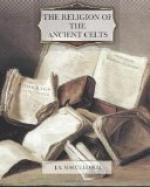Traces of the idea of an underworld of the dead exist in Breton folk-belief. The dead must travel across a subterranean ocean, and though there is scarcely any tradition regarding what happens on landing, M. Sebillot thinks that formerly “there existed in the subterranean world a sort of centralisation of the different states of the dead.” If so, this must have been founded on pagan belief. The interior of the earth is also believed to be the abode of fabulous beings, of giants, and of fantastic animals, and there is also a subterranean fairy world. In all this we may see a survival of the older belief, modified by Christian teaching, since the Bretons suppose that purgatory and hell are beneath the earth and accessible from its surface.[1181]
Some British folk-lore brought to Greece by Demetrius and reported by Plutarch might seem to suggest that certain persons—the mighty dead—were privileged to pass to the island Elysium. Some islands near Britain were called after gods and heroes, and the inhabitants of one of these were regarded as sacrosanct by the Britons, like the priestesses of Sena. They were visited by Demetrius, who was told that the storms which arose during his visit were caused by the passing away of some of the “mighty” or of the “great souls.” It may have been meant that such mighty ones passed to the more distant islands, but this is certainly not stated. In another island, Kronos was imprisoned, watched over by Briareus, and guarded by demons.[1182] Plutarch refers to these islands in another work, repeating the story of Kronos, and saying that his island is mild and fragrant, that people live there waiting on the god who sometimes appears to them and prevents their departing. Meanwhile they are happy and know no care, spending their time in sacrificing and hymn-singing or in studying legends and philosophy.
Plutarch has obviously mingled Celtic Elysium beliefs with the classical conception of the Druids.[1183] In Elysium there is no care, and favoured mortals who pass there are generally prevented from returning to earth. The reference to Kronos may also be based partly on myths of Celtic gods of Elysium, partly on tales of heroes who departed to mysterious islands or to the hollow hills where they lie asleep, but whence they will one day return to benefit their people. So Arthur passed to Avalon, but in other tales he and his warriors are asleep beneath Craig-y-Ddinas, just as Fionn and his men rest within this or that hill in the Highlands. Similar legends are told of other Celtic heroes, and they witness to the belief that great men who had died would return in the hour of their people’s need. In time they were thought not to have died at all, but to be merely sleeping and waiting for their hour.[1184] The belief is based on the idea that the dead are alive in grave or barrow, or in a spacious land below the earth, or that dead warriors can menace their foes from the tomb.
Thus neither in old sagas, nor in Maerchen, nor in popular tradition, is the island Elysium a world of the dead. For the most part the pagan eschatology has been merged in that of Christianity, while the Elysium belief has remained intact and still survives in a whole series of beautiful tales.




